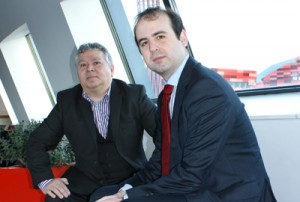16 April, 2013, by Francine Pickering
Managing Your Intellectual Property Assets
Speakers: Gary Townley, Intellectual Property Office and Simon Curtis, Potter Clarkson
“95% of UK businesses do not know the value of their intellectual property rights.”
That was the startling statistic that kicked off Gary Townley’s presentation, one that is made all the more concerning given the growing trend for intellectual property assets to outstrip fixed assets in value.
Intellectual property covers a wide range of aspects: patents, trademarks, registered designs, copyright, confidentiality, trade secrets and even plant varieties. Gary talked us through the main issues that face most businesses.
Every business has a trademark – a sign capable of being represented that distinguishes goods or services of one provider from those of another – although they are not all protected.
It might include a name, logo, domain name, slogan, colour theme (think Cadbury’s Dairy Milk purple), a shape or theme (such as Toblerone’s distinctive appearance), music (Intel), and even smells and hand gestures.
Good trademarks are eye catching, memorable – and tell you nothing about the goods and services! Apple might be a great trademark for technology but it wouldn’t work for a greengrocers.
Design registration can be applied to the shape or look of a product but not to its function, the materials that it is made of or the technology used to manufacture it.
A popular example is Monkey, the distinctive mascot of PG Tips. What is more surprising is that the design rights are owned, not by Unilever but by Comic Relief.
Patents must comply with three criteria:
- The patentable element must be new and not known anywhere else in the world.
- It must be an innovative step forward not a simple adaptation.
- It must have a technical effect.
It’s worth bearing in mind that it is not the job of the Intellectual Property Office to pass judgement on the commercial potential of an invention – hence the more bizarre examples of a pair of slippers with handles that double as fly swats or the personal water collector (which looked an awful lot like an upsidedown umbrella). Gary did assure us that, amusing as the weird and wacky inventions are, they represent only around 2% of all patents applied for, which amount to about 17,000 a year.
Copyright is free and automatic in the creation of a wide variety of works from reports to books, from videos to software.
Copyright lies with the first creator or their employer if the work is carried out in their ordinary course of employment. If a piece of work is contracted then it remains with the contractor unless otherwise assigned.
With changing times and consumer habits there are changes ahead affecting private copying for the individual’s own use, educational use, quotation, parody and archiving and preservation.
Gary ended with a few tips:
- Look into Research and Development tax credits – they might cover more than you would expect.
- Patent holders should look into the Patent Box to exploit lower corporation tax levels for profits on patentable elements.
- Start your new IP management policy by using the IPO’s free IP Health check tool.
Once you’ve audited your intellectual property you then need to manage it. What should your IP strategy look like?
Simon Curtis shared a couple of case studies where small businesses had identified a range of different IP assets that could be used both defensively, to protect them against competitors, and offensively, in their future planning.
His primary point was that your plan for managing your intellectual property should be an extension of your business plan. The extent of your IP protection (UK, Europe, further afield) depends on your plans for the business – where are your current and prospective markets, for instance?
It’s important to manage your IP and with financial incentives to do so and support from the Intellectual Property Office, there’s every reason to do so.
“A very good session – well led.”
“IPO – a good source of information and A1 presentation.”
“Excellent knowledge from the speakers – a first class event.”
The Ingenuity Knowledge Exchange breakfasts are free and open to all business owners. The next event is on 4 June 2013 when Professor Bob Berry from Nottingham University Business School returns with Martial Arts for Debt Collecting. Book your free place online here.


Another interesting presentation from Ingenuity – it was good to hear the facts from the IPO and the cases studies of how an IP strategy can work in practice from Simon Curtis. I hope the information I shared about the Patent Box was useful – there is more information on the Coalesco blog at http://www.coalesco.co.uk